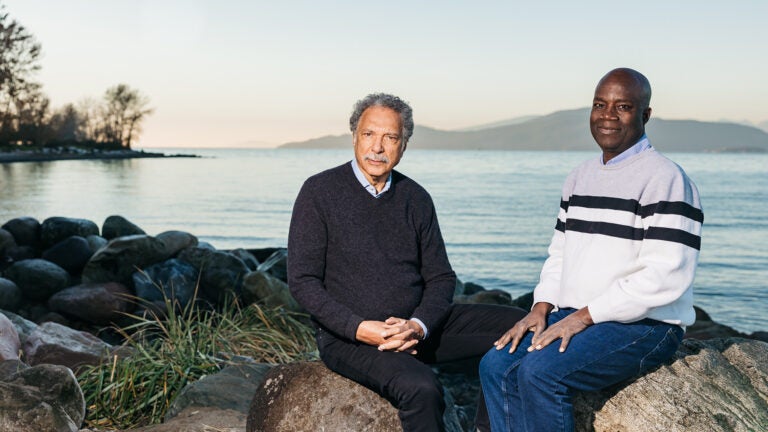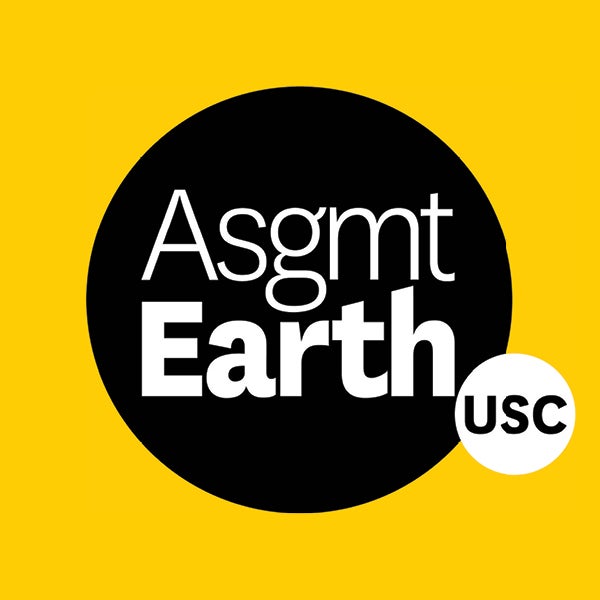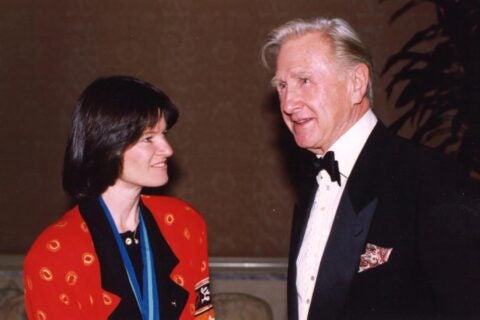
The 2023 Tyler Prize for Environmental Achievement laureates Daniel Pauly, left, and Rashid Sumaila join an illustrious group of previous winners of the Tyler Prize. The pair will be presented with the prize and the $250,000 prize at a ceremony on Friday, April 28, at USC. (Photo/Kim Bellavance)
Tyler Prize award ceremony returns to USC for its 50th anniversary
On April 28, the Tyler Prize for Environmental Achievement ceremony returns to its home at USC to celebrate this year’s laureates, marine biologist Daniel Pauly and economist Rashid Sumaila.
Editor’s note: This retrospective story about 50 years of the Tyler Prize has been updated to include a photo of this year’s prize winners. The original lead photo, which now appears below, was chosen to reflect the history of the Tyler Prize.
Unprecedented pollution in the oceans. Smog-filled skies over Los Angeles. A growing recognition that the Earth and its resources are fragile and worthy of protection. The environmental concerns of the early 1970s mirror those we face today, but in 1973 these ideas were only beginning to gain a foothold in the popular consciousness.
 The Tyler Prize for Environmental Achievement, now in its 50th year, played a significant role in this cultural shift. Due in part to award ceremonies filled with Hollywood stars hobnobbing with top environmental researchers, the prize grew in prestige, and it is now considered the Nobel Prize for the environment.
The Tyler Prize for Environmental Achievement, now in its 50th year, played a significant role in this cultural shift. Due in part to award ceremonies filled with Hollywood stars hobnobbing with top environmental researchers, the prize grew in prestige, and it is now considered the Nobel Prize for the environment.
On April 28, the ceremony returns to its home at USC and Los Angeles to celebrate this year’s laureates, marine biologist Daniel Pauly and economist Rashid Sumaila, both of whom study the status of the world’s fisheries; the award will be presented the previous day. Pauly and Sumaila’s call to ban high seas fishing, in order to protect biodiversity and maintain food security, is rooted in interdisciplinary research. A prize rewarding this work has a fitting home at USC.
“USC excellence in sustainability research has blossomed under the leadership of President Carol L. Folt, and the return of the Tyler Prize award ceremony — the preeminent environmental research prize — to our campus for its 50th anniversary is fitting given this commitment,” said Ishwar K. Puri, USC senior vice president for research and innovation. “Interdisciplinary research, like that we foster at USC, is required to provide groundbreaking sustainability solutions to the challenges we face. The Tyler Prize’s emphasis on this model of discovery is admirable and necessary.”
Tyler Prize: Hollywood stars shine a spotlight on environmentalism
The prize was the brainchild of Southern California philanthropists John and Alice Tyler. As co-founder of Farmers Insurance, John Tyler sought to use his fortune to better the world. Environmental conservation emerged as one way to make a difference. At the time, no award recognizing environmental research existed, so the Tylers approached Pepperdine University to administer the award that bears their name.
From its beginning in 1973, the Tyler Award ceremony quickly became a place to be seen. Alice Tyler invited her friends Paul Newman, Ronald Reagan and Robert Redford to the ceremony to increase its visibility and raise awareness of the crises threatening the planet. Seminal figures in ecological, oceanic and other areas of research such as Arie Jan Haagen-Smit (who discovered the link between smog and cars) and René Dubos (the microbiologist who wrote So Human an Animal) won the award, lending it credibility. Nobel laureates Paul J. Crutzen, Mario Molina and F. Sherwood Rowland had all previously won the Tyler Prize.

This mix of glamour and science — which shone a spotlight on environmentalism — was no accident, according to Judith McDowell, scientist emeritus at Woods Hole Oceanographic Institution in Massachusetts.
“The concept when I joined the committee was still very traditional,” said McDowell, who has served on the prize’s executive committee since 1998. “First-class flight and spend three or four days in town for the meeting. Many members of the committee were familiar with the Hollywood crowd, and it was great because there are a lot of environmental heroes in Hollywood. But you don’t have to use celebrities to gain international coverage now — things have changed, and the community at large has changed.”
USC took over administration of the prize in 1980. The award ceremony retained its luster, with environmentally conscious celebrities such as Betty White, Lloyd Bridges and others in attendance through the early 2000s. The growing importance of climate research and an emphasis on more diverse laureates led to the award ceremony moving to the East Coast and even London in recent years.
“In the past 20 years, the award became much more international,” said Stephen Bradforth, senior adviser to the dean for research strategy and development at the USC Dornsife College of Letters, Arts and Sciences and USC’s ex officio member of the prize’s executive committee from 2017-21. “We’re the custodian of the award, but by hosting the ceremony at USC, we can become a convening point for researchers visiting our campus. The Tyler Prize gives USC visibility among universities in the environmental space because it is one of the major environmental prizes in the world.”
Tyler Prize evolves to meet growing climate change challenges
As scientists grappled with the growing complexity posed by climate change during the past 50 years, the Tyler Prize evolved in kind. In particular, the growth of interdisciplinary research combining policy and social factors with research from the natural sciences led to a broader array of laureates. McDowell said its development into a prize that rewards novel approaches to climate challenges was intentional.
The Tyler Prize is unique in that it focuses on not only an environmental issue, but the impact of solutions on that issue.
Judith McDowell, Woods Hole
Oceanographic Institution
“The Tyler Prize is unique in that it focuses on not only an environmental issue, but the impact of solutions on that issue,” she said. “The award went from recognizing scientists whose work was used to improve an environmental policy, to a more multidisciplinary approach. Not just chemistry or physics, but also policy and economics — all from a more international perspective.”
This year’s laureates continue that evolution. Daniel Pauly and Rashid Sumaila investigate the effects of overfishing from an ecological and economic perspective, respectively, as members of the Institute for the Oceans and Fisheries at the University of British Columbia. Jan Amend, professor of Earth sciences and biological sciences at USC Dornsife, is the current USC representative on the prize’s executive committee. He said this year’s winners combined “stellar science” with impactful outreach, well-deserving of the $250,000 prize.
“Both Daniel and Rashid were nominated separately for their research on the health of the oceans,” Amend said. “When the committee was considering them, we found that they actually collaborated together and were friends. The combination of science and economics policy is true to the spirit of the Tyler Prize — excellent research paired with inclusive public outreach via databases and publications.”
The Tyler Prize will continue to evolve in its second half-century. Both McDowell and Amend mentioned that while previous winners largely hailed from North America and Europe, they hope future laureates will better reflect the global nature of the crisis. And according to USC Chief Sustainability Officer Mick Dalrymple, finding the connections between seemingly unrelated environmental concepts makes it stand apart.
“The Tyler Prize’s impact is huge — the executive committee consists of some of the top environmental scientists in the world essentially saying, ‘Look at the incredible and incredibly important work that this person (or people) accomplished on this topic that should be on everyone’s radar,’” Dalrymple said.
“In this year’s case, it is about bringing attention to overfishing in the oceans and how to reverse that to improve biodiversity, equity and economics and to fight climate change. Most people would not inherently see all those connections, but the Tyler Prize shines a light on them while celebrating the scientists who have invested their careers in researching those connections.”



